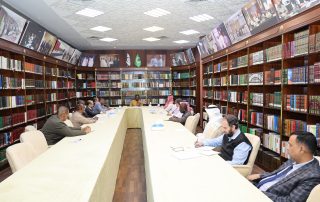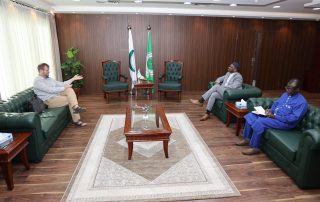
In the Name of Allah, the Entirely Merciful, the Especially Merciful
All praise is due to Allah, Lord of the worlds, may the blessings and peace of Allah be upon our master Muhammad, the seal of prophets, on his family, and all his companions
Resolution No. 234 (5/24)
on
Achieving Food and Water Security:
Most Critical Problems and Effects on the future Challenges of the Ummah
The Council of the International Islamic Fiqh Academy of the Organization of Islamic Cooperation, held in its twenty-fourth session in Dubai (United Arab Emirates), on 7-9 Rabi’ al-Awal 1440, corresponding to 4-6 November 2019,
Having reviewed the research papers submitted to the Academy on the subject of Achieving Food and Water Security: Most Critical Problems and Effects on the Future Challenges of the Ummah.
Having listened to the extensive discussions on the subject,
Resolves the following
First, water security means the supply of safe water for human use, enough to meet the needs of the country in quantity and quality and to ensure its continuity without interruptions.
Second, food security means providing people with safe and healthy food while ensuring the minimum nutritional needs of all members of society.
Third, recommendations:
As Islam calls for the preservation and economy of water and food and prohibits excess and waste in everything that harms humans and societies, the Council of the Academy recommends the following:
- Governments of Muslim countries should prioritize the issue of water and food security, and develop policies and programs to rationalize water and food consumption.
- As dictated by Shariah, Muslims should save water and food and not waste them.
- Scientists specialized in hydrology, agriculture and the environment, should strive to establish devices and find solutions to ensure water and food security. They should also take advantage of techniques provided by the fourth industrial revolution in the field of water recycling, in accordance with the regulations and rulings of Shariah.
- Muslim countries have to urgently cooperate to solve problems related to water and food shortages by establishing appropriate policies and plans to ensure developing water resources and achieving food security. They should also cooperate with regional as well as international organizations specialized in water and food areas.
- Use modern seed production techniques and improve agricultural development equipment to ensure higher production rates and to achieve food security.
- Muslim countries should endeavor to benefit from Shariah teachings and regulations in regard to developing agricultural resources by following the doctrine of revitalizing dead lands, as advocated by Shariah teachings and regulations, and should also endeavor to remove obstacles to its realization.
Allah Knows Best
Read Also
Lastest








